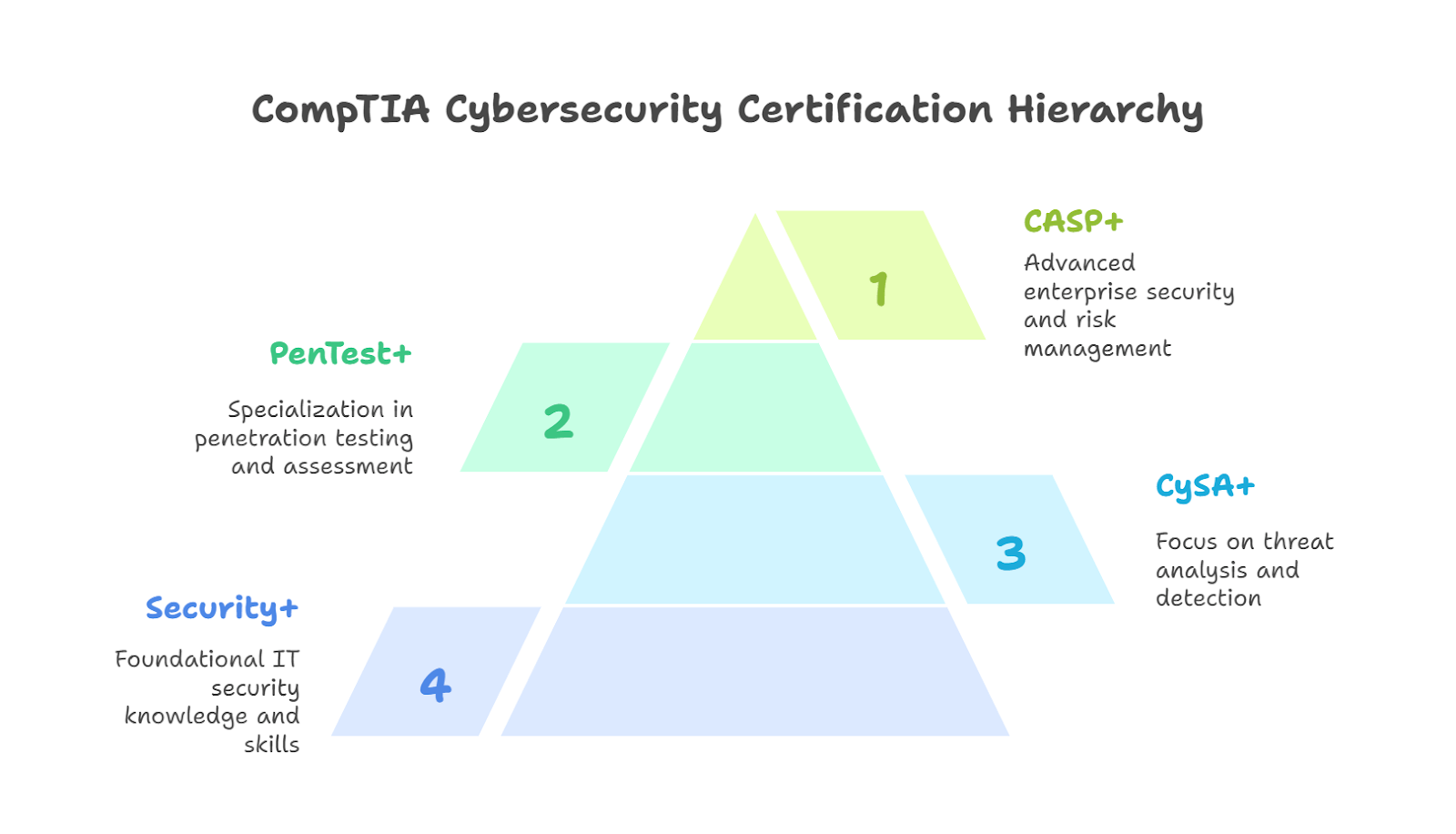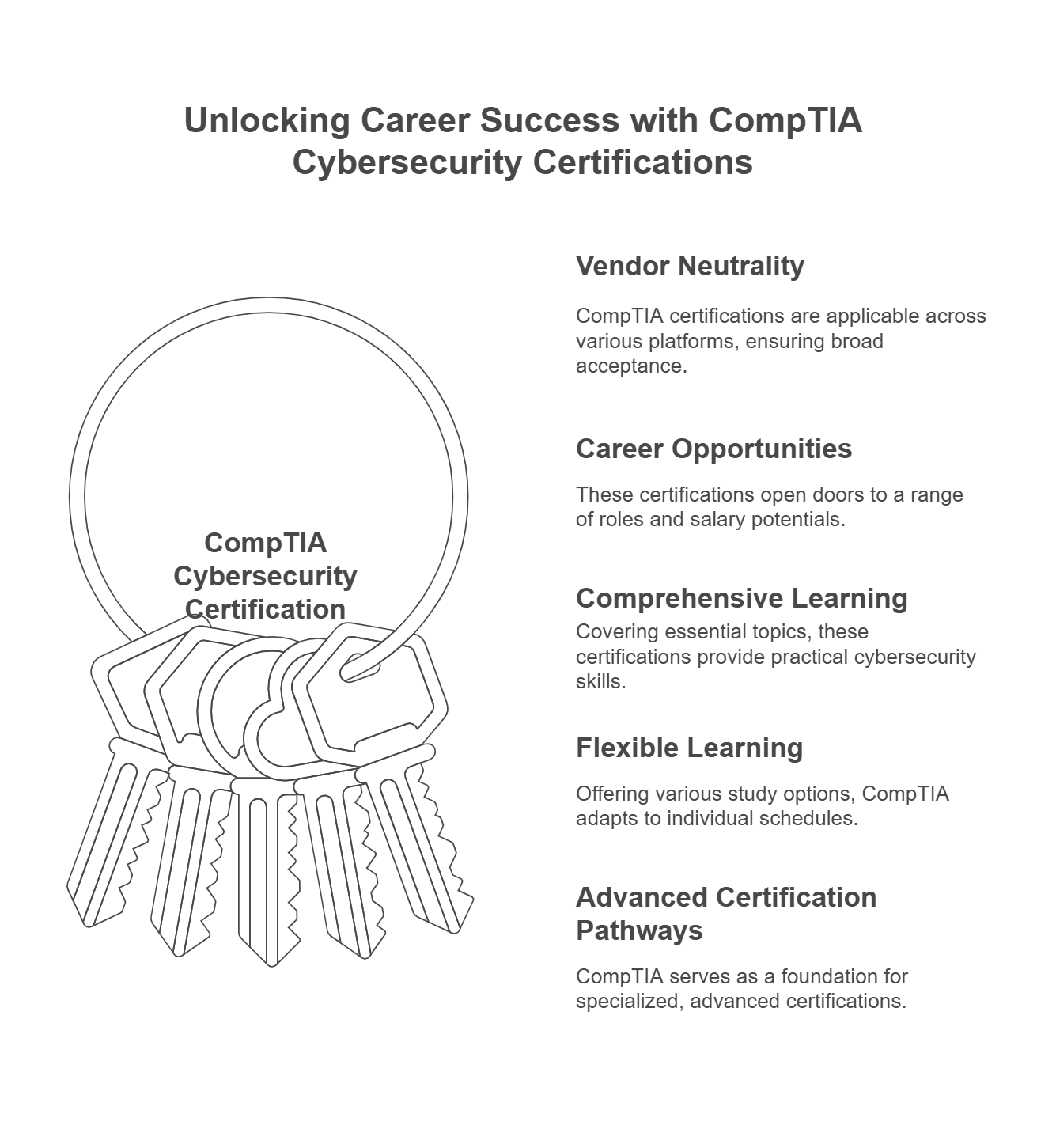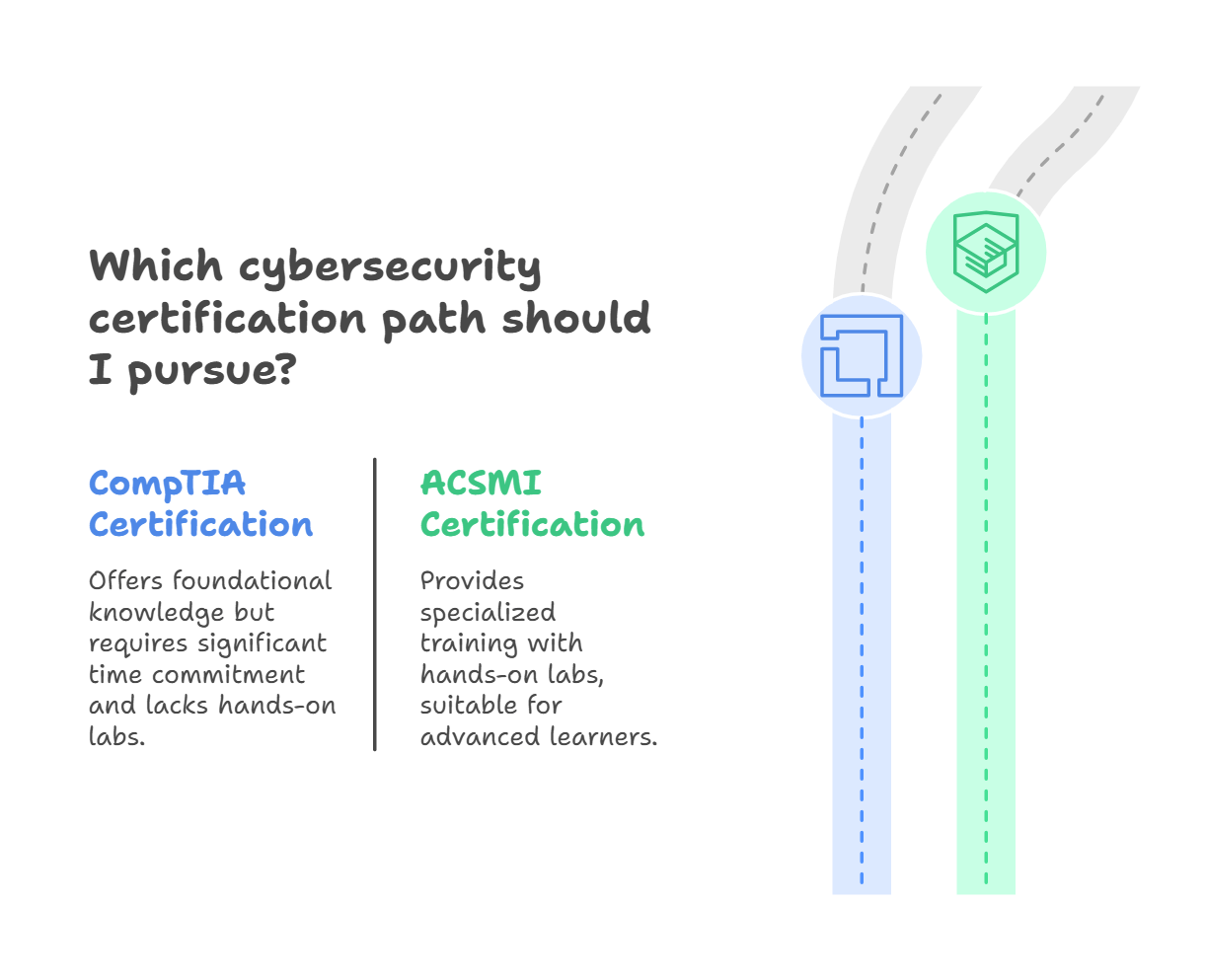Table of Contents
- What Is CompTIA Cybersecurity Certification?
- CompTIA Cybersecurity Certifications Overview
- Why Choose CompTIA Cybersecurity Certification?
- How Much Does CompTIA Cybersecurity Certification Cost?
- Challenges with CompTIA Cybersecurity Certification
- How CompTIA Cybersecurity Certification Compares to ACSMI Certification
- Final Thoughts
- Frequently Asked Questions (FAQs)
In today’s interconnected world, cybersecurity is no longer just a specialized IT field—it’s become a necessity. As technology evolves, so do cyber threats, and organizations need skilled professionals to safeguard their systems, data, and networks from malicious actors. As cyberattacks grow in sophistication, the demand for cybersecurity professionals continues to surge.
One of the best ways to break into the cybersecurity field, enhance your career, and stay ahead in this fast-paced industry is through obtaining a certification. If you’re wondering What Cybersecurity Certification Should I Get First, one of the most recognized certifications globally is the CompTIA Cybersecurity Certification. In this blog, we will explore everything you need to know about this certification, from its value, types, costs, and career opportunities, to how it compares to other certifications, such as ACSMI Certification.
What Is CompTIA Cybersecurity Certification?
The CompTIA Cybersecurity Certification is a suite of industry-recognized credentials offered by CompTIA, a leading IT trade association. These certifications are designed to validate the skills and knowledge of individuals working in cybersecurity. They cater to all levels of professionals—from beginners to seasoned experts—by offering certification programs that focus on essential cybersecurity practices, from network security and risk management to threat detection and response.
CompTIA Cybersecurity Certifications Overview

CompTIA offers a range of cybersecurity certifications to cater to different stages of a professional’s career. These include:
-
CompTIA Security+ (Entry-Level)
-
This is the most well-known entry-level certification for cybersecurity. Security+ provides foundational knowledge in IT security, focusing on network security, risk management, cryptography, and disaster recovery.
-
Ideal for beginners, it helps you build a solid understanding of basic security concepts and prepares you for entry-level roles such as IT Security Administrator and Network Security Administrator.
-
-
CompTIA Cybersecurity Analyst (CySA+) (Intermediate Level)
-
CompTIA CySA+ is for professionals who want to focus on threat analysis and detection. It prepares you to understand and mitigate threats through behavioral analytics, making it ideal for blue-team professionals working on proactive security measures.
-
The certification is perfect for individuals aiming for positions like Security Analyst or Threat Analyst.
-
-
CompTIA PenTest+ (Advanced Level)
-
This certification focuses on penetration testing and vulnerability assessment. It is designed for individuals who want to specialize in offensive security—identifying vulnerabilities in systems and exploiting them in a controlled manner to improve security.
-
It is perfect for roles such as Penetration Tester or Ethical Hacker.
-
-
CompTIA Advanced Security Practitioner (CASP+) (Expert Level)
-
CASP+ is an advanced-level certification aimed at experienced cybersecurity professionals. It covers enterprise-level security, complex security architecture, and advanced risk management.
-
Ideal for professionals aiming for senior roles such as Chief Information Security Officer (CISO) or Security Architect, CASP+ helps you gain the leadership skills needed to manage large-scale cybersecurity operations.
-
Why Choose CompTIA Cybersecurity Certification?

1. Industry Respect and Vendor Neutrality
One of the standout features of Cybersecurity Certification Canada is its vendor-neutral nature. Unlike certifications that are tied to specific technologies (e.g., Cisco, Microsoft, AWS), Cybersecurity Certification Canada focuses on general cybersecurity principles applicable across various platforms and systems. This makes it a versatile credential accepted by employers worldwide, regardless of the specific technologies they use.
2. Career Opportunities from Entry-Level to Advanced Roles
CompTIA certifications provide significant career opportunities. CompTIA Security+, for example, can help you land your first cybersecurity role, such as a network security administrator or IT security analyst, where salaries range from $60,000 to $80,000 annually. As you advance in your career and earn more specialized certifications like CySA+ or PenTest+, your earning potential increases, and you’ll have access to roles in threat analysis, penetration testing, and enterprise-level security management.
3. Comprehensive Learning Experience
CompTIA’s certifications cover a wide range of essential cybersecurity topics, such as:
-
Network Security
-
Malware Analysis
-
Disaster Recovery Planning
-
Risk Management
-
Cryptography
The training and preparation for these certifications ensure that you gain not just theoretical knowledge, but practical skills needed to protect digital infrastructures from a wide range of threats.
4. Flexible and Self-Paced Learning
CompTIA certifications offer flexibility in how you can study. Whether you prefer online self-paced learning or instructor-led courses, CompTIA provides options to suit your needs. Self-paced learning allows you to fit your certification preparation into your schedule, making it easier to balance your work or personal life.
5. Stepping Stone to Advanced Certifications
CompTIA certifications lay the foundation for more advanced learning and career opportunities. Once you have obtained certifications like CompTIA Security+ or CySA+, you can pursue specialized certifications from providers like ACSMI, which offers in-depth training in fields such as ethical hacking, forensic analysis, and multi-layered security architectures.
How Much Does CompTIA Cybersecurity Certification Cost?
The cost of CompTIA Cybersecurity Certification varies depending on the specific certification and study materials. Here’s a breakdown of the typical costs:
-
CompTIA Security+: Exam fee is approximately $392.
-
CompTIA CySA+: Exam fee is approximately $392.
-
CompTIA PenTest+: Exam fee is approximately $392.
-
CompTIA CASP+: Exam fee is approximately $494.
In addition to the exam fees, you may need to invest in study materials, practice exams, and instructor-led courses, which can add between $250 to $1,000 to your total investment.
Instructor-led classes, which provide more interactive learning, may range between $1,200 and $2,500 for comprehensive training. Taking into account study resources and exam fees, the total cost for obtaining a CompTIA certification can range between $392 and $3,500.
Challenges with CompTIA Cybersecurity Certification
While the CompTIA Cybersecurity Certification offers great value, there are some challenges to be aware of:

1. Time Commitment
Preparation for CompTIA certifications requires significant time and effort. On average, you can expect to spend 2 to 4 months preparing for each certification exam. This can be challenging if you are balancing other responsibilities, such as work or personal commitments.
2. Limited Depth for Advanced Learners
Although CompTIA certifications are excellent for building foundational knowledge, professionals at an advanced level might find the training lacking in depth for specialized areas. For individuals interested in areas like ethical hacking, forensics, or zero-trust security, they may need to pursue certifications like ACSMI, which offer hands-on labs and specialized training.
3. No Hands-On Labs in Lower Tiers
Certifications like Security+ provide valuable foundational knowledge but lack hands-on labs and practical simulations that more advanced certifications like ACSMI offer. Practical training is essential for advanced concepts such as penetration testing and vulnerability assessment, which are better addressed by programs like ACSMI Certification.
How CompTIA Cybersecurity Certification Compares to ACSMI Certification
Both CompTIA Cybersecurity Certification and ACSMI Certification offer valuable credentials for cybersecurity professionals, but they cater to different levels of expertise.
CompTIA Cybersecurity Certification
CompTIA certifications are a great starting point for beginners and intermediate professionals. They cover foundational cybersecurity concepts and prepare individuals for a range of roles, such as cybersecurity analyst, network security administrator, or penetration tester.
ACSMI Certification
In contrast, ACSMI Certification is designed for more advanced professionals seeking specialized skills. With over 400 modules focusing on advanced topics like ethical hacking, cyber forensics, cloud security, and multi-layer zero-trust architectures, ACSMI offers deeper insights and more hands-on experience.
For individuals looking to reach senior leadership roles, such as CISO or Security Consultant, ACSMI Certification is the perfect next step after obtaining a CompTIA certification.
Final Thoughts
CompTIA Cybersecurity Certification is a critical first step for anyone looking to enter the cybersecurity field. It provides the foundational knowledge and skills needed to start a successful career in one of the most in-demand industries. Whether you’re a beginner looking to earn your first certification or an experienced professional ready to enhance your skills, CompTIA certifications offer a structured path to career success.
However, as the cybersecurity landscape continues to evolve, it’s essential to continue learning and gaining specialized skills. ACSMI Certification, with its over 400 modules focusing on advanced cybersecurity topics, is the next logical step for professionals looking to lead in this dynamic field.
By combining CompTIA certifications with more advanced programs like ACSMI Certification, you’ll position yourself as a well-rounded expert, ready to tackle the complex cybersecurity challenges that organizations face today and in the future.
Frequently Asked Questions (FAQs)
1. What is CompTIA Cybersecurity Certification?
CompTIA Cybersecurity Certification is a globally recognized credential that validates a professional’s expertise in various aspects of cybersecurity, from network security to ethical hacking.
2. How much does CompTIA Cybersecurity Certification cost?
The exam fees for CompTIA certifications range from $392 to $494, with additional costs for study materials and instructor-led courses.
3. Is CompTIA Cybersecurity Certification worth it for beginners?
Yes! CompTIA Security+ is an excellent starting point for beginners, providing a comprehensive foundation in cybersecurity concepts and practices.
4. Can CompTIA Certification lead to senior roles?
For senior roles, professionals often combine CompTIA certifications with specialized certifications like ACSMI to gain advanced skills and leadership training.
5. How long does it take to earn a CompTIA certification?
On average, it takes 2-4 months to prepare and pass a CompTIA certification exam, depending on your prior experience and study schedule.

Leave a Reply